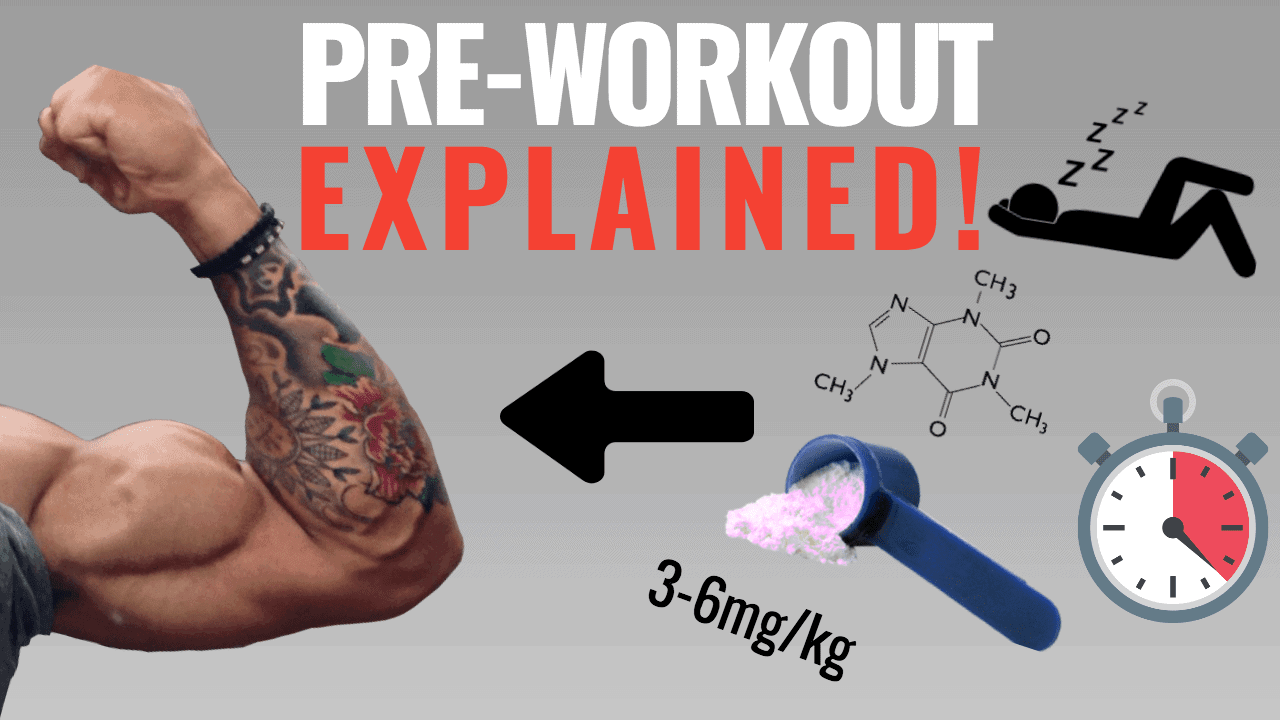
Pre-Workout Supplements: How To Best Use Them To Enhance Growth While Avoiding Side Effects
If you want to know what research has to say about pre-workout supplements and how to properly use them to your advantage... Then you need to read this article.
Pre-workout supplements are a popular go-to product when it comes to enhancing performance and giving you that extra boost you need during a tough workout.
It’s also one of the most well-researched supplements within the fitness industry. With several studies backing its effectiveness in terms of increasing training volume and boosting muscular endurance while reducing your levels of perceived effort during your workout (training volume – which all theoretically leads to better muscle growth in the long run.
However, despite the growing popularity of pre-workouts, there seems to be a lack of information out there regarding how exactly to use it in order to maximize its effectiveness while minimizing any potential side effects.
Luckily, in this article we'll discuss just that by covering the following points:
- How often should you take pre workout?
- How much pre workout should you take?
- When should you take your pre workout?
Before we dive into how to use pre-workout supplements optimally, it’s first important to understand what makes them work in the first place.
Of course, by now, you should know that you need to not only take care of supplementation, but also training and nutrition to see the best results. That's why I've designed every BWS program to be an all-in-one, science-based process that’ll get you to your dream physique FAST. And best of all? It's all rooted in science. For more information:
Click the button below to take my analysis quiz to discover the best program for you:
↓
What Makes Pre-Workouts "Work"?
The truth about pre-workout supplements is as follows:
Although there’s a variety of common ingredients included in your typical pre-workout - which each do have some evidence supporting their benefit and is something I’ll likely cover in a separate video - the main ingredient responsible for the majority of the positive effects of pre-workouts and the one ingredient you should be most concerned about is caffeine!
Which is why the majority of this video will be directed towards caffeine - as most of the effects (and side effects) you'll come across with pre-workouts will be from caffeine.
So with that being said, let's take a look at how to best use pre-workout!
#1: How Often Should You Take Pre-Workout?
Although the positive benefits and energy boost provided by pre-workouts may tempt you to take it before every single workout, it’s likely best that you don’t.
This is because multiple studies have shown that habitual pre-workout intake can quickly cause you to be tolerant to the effects of caffeine....
...meaning that the more often you take it, the more you’ll have to continuously increase the dose of your pre-workout in order to feel the acute benefits it provides during your workout.
And in fact, research has found that eventually you’ll even reach something called an “insurmountable tolerance” to caffeine. Which means that:
Increasing the dose of your pre-workout will no longer enable you to overcome your tolerance to it.
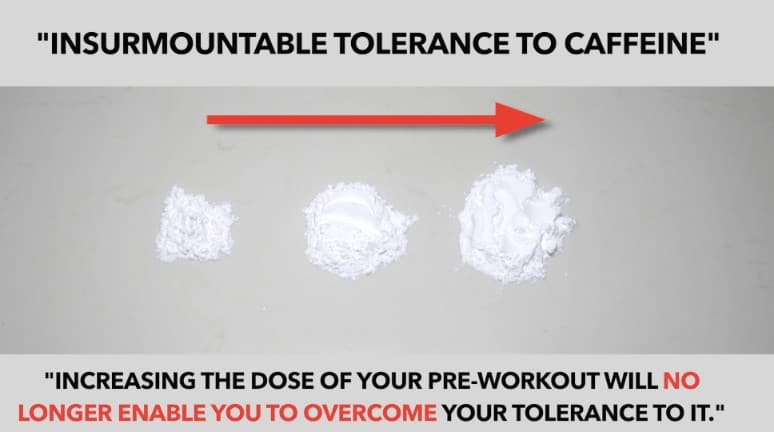
Simply meaning that at this point, ingesting a pre-workout will essentially be useless aside from any placebo effect it may provide.
So what should you do instead?
Well, multiple studies examining the effect of pre-workouts on workout performance have actually found that it seems to provide a greater benefit for lower body strength than upper body strength.

Which is probably because lower body exercises in general are just harder and require more perceived effort than upper body exercises. And since pre-workouts reduce your perception of effort, it gives you the extra boost needed during strenuous leg days which otherwise may not be as necessary during upper body days.
Therefore, to avoid quickly becoming tolerant to the effects of your pre-workout, it would be wise to only use it during your lower body workouts where you feel you need the extra boost:
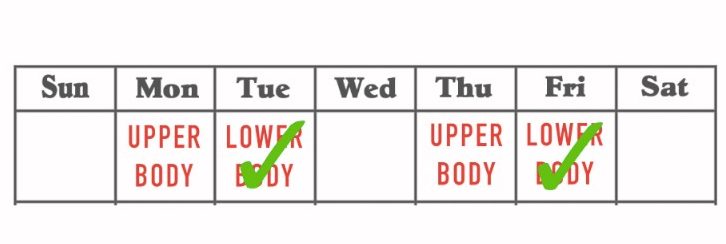
As doing so will help prevent the benefits of your pre-workout from diminishing throughout the weeks.
Consider Periodically Cycling Off of Any Caffeine!
In addition, if you’ve been relying on pre-workout for a while and have become noticeably tolerant to its effects, then it would be wise to re-sensitize your body to caffeine.
You can do this by simply taking at least a week or 2 off of any caffeine or gradually lower then increase your dose overtime. Doing so will enable you to once again feel the acute effects that caffeine provides.
Not all of your supplements need to be cycled on and off. If you wish to get more guidance on this, our 3-on-1 coaching program is the perfect answer. You will not only have a dietitian to customize your nutrition and supplementation plan, but also a coach to focus on your training plans - plus, there's me to answer your questions every month! You'll achieve your dream physique in record-breaking time. Sounds good? Let's get started then:
Click the button below to find out more about the 3-on-1 coaching program:
↓
#2: How Much Pre-Workout Should You Take?
Now as for how much of your pre-workout to take in order to maximize its benefits, this will mainly depend on two things:
- Your current bodyweight
- Your current habitual caffeine intake.
Most of the research in support of caffeine’s ergogenic effect on performance used a dosage of roughly 3-6 mg of caffeine / kg of bodyweight and is therefore likely a good range to stay within for most people.
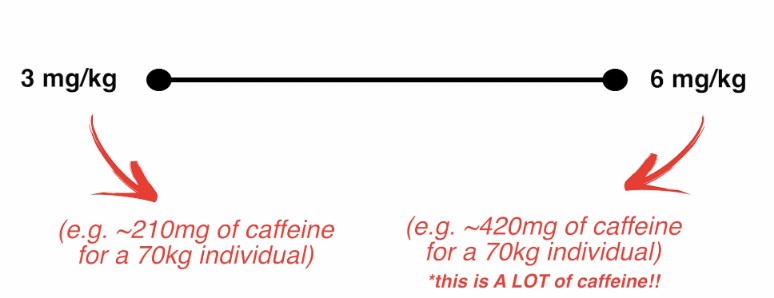
However, research also indicates that:
The closer your habitual caffeine dose is to your pre-workout caffeine dose, the less consistent the beneficial effects will become.
So for example, if you already regularly consume 200mg of caffeine through various sources throughout the day...
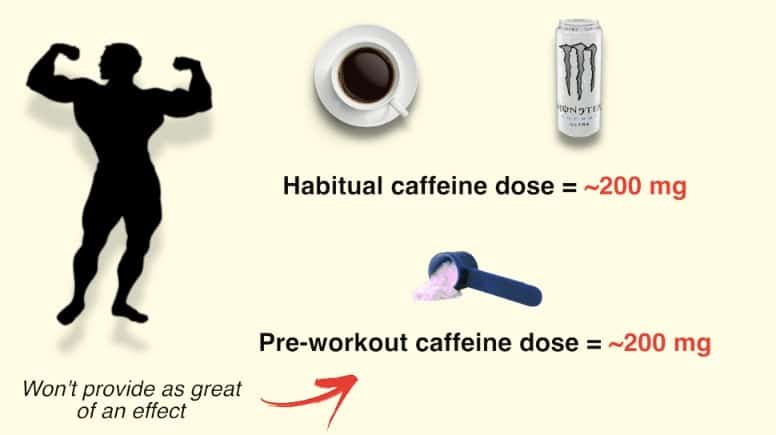
...then intaking 200mg of caffeine as a pre-workout won’t provide as great of an effect when compared to someone who’s used to a lower daily consumption of caffeine.
Meaning that you should first consider how much caffeine you already intake on a daily basis when figuring out the optimal dose of your pre-workout, as you’ll likely need a higher dose if you already consume quite a bit of caffeine regularly.
But regardless, it’s important that if you’re not consuming any caffeine or anything close to 6mg/kilogram per day OR you find yourself sensitive to caffeine in general, then it’s wise not to triple or quadruple your caffeine consumption immediately just to hit the recommended dosage!
Instead, I’d suggest starting even below this range and building your way up as needed and decreasing the dosage if you experience any negative side effects.
For example, one scoop of a typical pre-workout often contains around 200mg or so of caffeine.
So initially starting out with ¾ of a scoop or even just ½ a scoop of your pre-workout and building your way up as needed would be an effective and safe way to find your sweet spot.
#3: When Should You Take Your Pre-Workout?
Now as for when exactly to take your pre-workout:
Taking it too early prior to your workout will cause its effects to diminish shortly after you start your workout. Whereas taking it too late means you won’t feel its full effects until later on in your workout.
So given that most of the research out there indicates that taking it 30-45 minutes before your workout is best (which is on average the time it takes for caffeine to reach a peak level in your blood and is when you’ll feel its effects the most) I’d suggest sticking with that.
Just make sure that you also consider the time it takes to get to your gym and any warm up protocols you do before your workout. As it’s best to have the pre-workout fully kick in for your working sets rather than during your drive to the gym or during your warm-up.
Consider The Time of Day!
In addition, given that caffeine has a half-life of roughly 3-5 hours, the time of day in which you take your pre-workout is something you should consider as well if you want to minimize any potential side effects.
For example, one 2013 paper from the Journal of Clinical Sleep Medicine compared the effects of caffeine on sleep when ingested 3 hours or 6 hours before sleep.
The researchers found that when compared to a placebo:
Moderate caffeine ingestion 6 hours before sleep reduced total sleep time by 41 minutes and caffeine ingestion 3 hours before sleep reduced total sleep time by 63 minutes.
And in both conditions, it also took subjects more than double the time to fall asleep and significantly reduced their sleep quality. The results are also summarized in the below graphic.
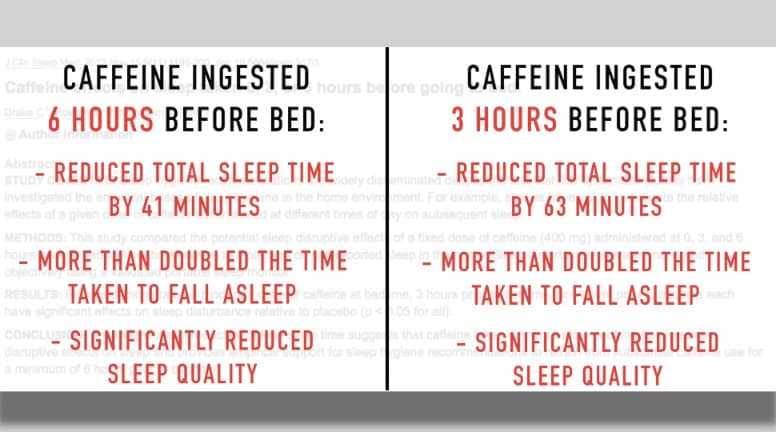
Simply meaning that if you don’t want your pre-workout to affect your sleep - which in itself is extremely important for muscle growth and recovery - it would be best to avoid taking it too close to your bedtime.
Practical Takeaways
So to sum up the article, here are the main points:
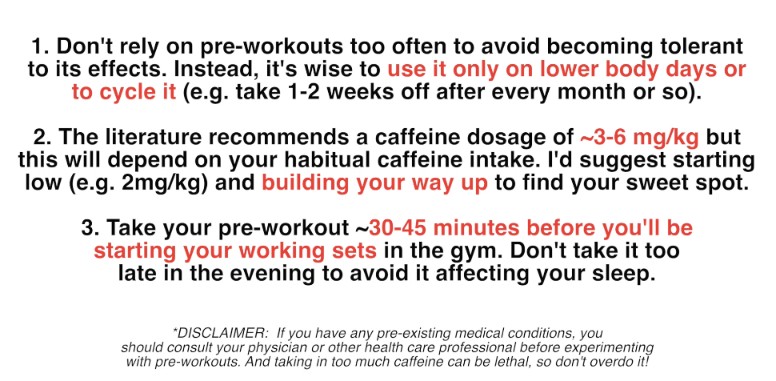
Keep in mind though guys that using a pre-workout is by no means necessary and is something you shouldn’t have to rely on to get your workouts done. In fact, I didn’t use a pre-workout for the first several years of my own training.
And I only use it now when I need that extra little boost.
As I always try to emphasize, supplements are just a very small piece of the puzzle and the majority of your results will be seen with a proper training and nutrition plan!
Anyways, that's it for today. Let me know if you have any questions down below and show your support by giving me a follow on Instagram , Facebook , and Youtube where I’ll be posting informative content on a more regular basis! Cheers!
And for those looking for a complete step-by-step program that uses science to show you how to properly train AND eat week after week to transform your body in the most efficient and injury-free way possible, then:
Click the button below to take my analysis quiz to discover the best program for you:
↓




